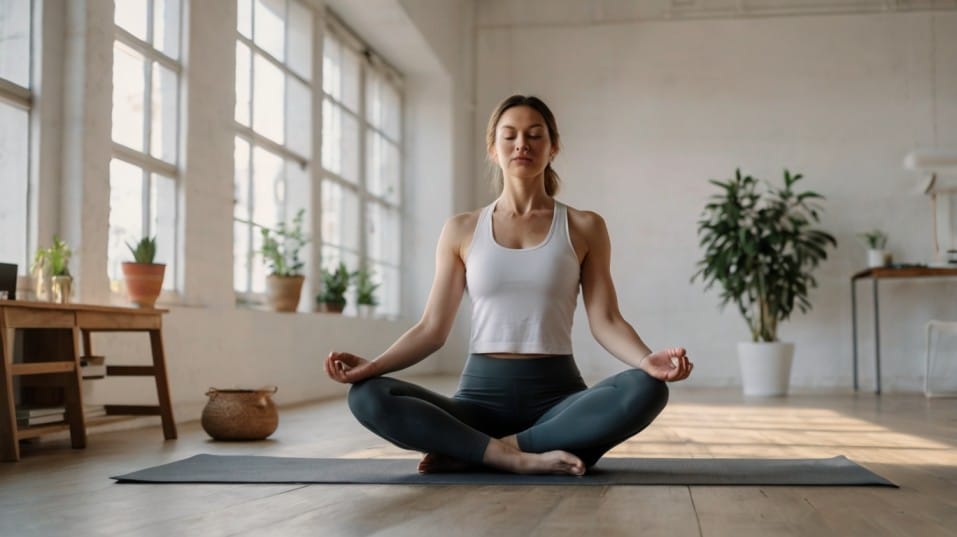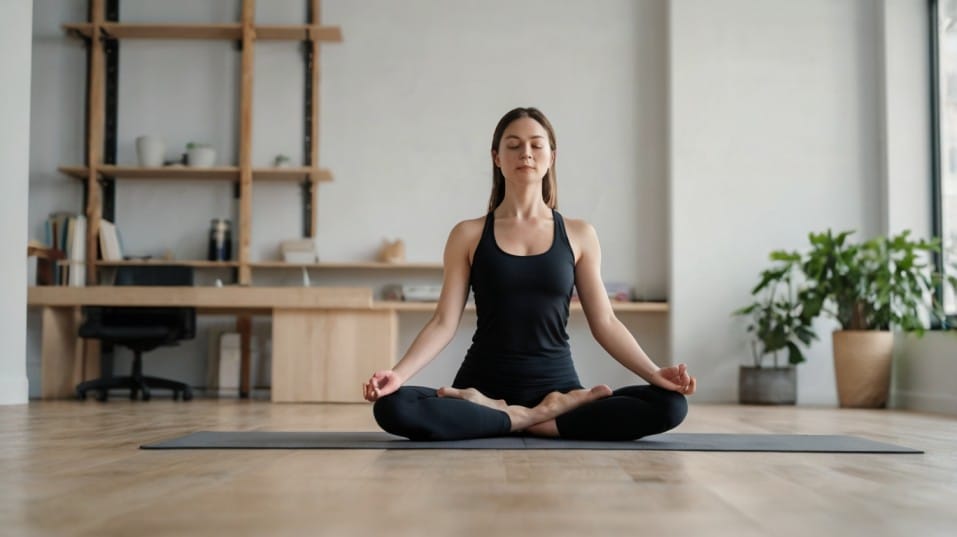Why Yoga and Mindfulness Are the Perfect Productivity Pair
Discover why yoga and mindfulness are the perfect productivity pair. Learn practices for focus, stress reduction, and energy management at work.

What if your ability to stay sharp, focused, and energized wasn’t tied to endless to-do lists or caffeine fixes?
Yoga and mindfulness offer a science-backed way to boost productivity by training your mind and body to handle stress, stay present, and think clearly.
These practices don’t just enhance well-being—they sharpen cognitive function, improve emotional resilience, and sustain energy levels throughout the workday.
The best part? You don’t need hours of practice. Just a few simple techniques can make a lasting difference.
The Science Behind Yoga and Mindfulness for Productivity
Before diving into specific techniques, it's important to understand why these practices are so effective. The way yoga and mindfulness influence the brain and body explains their profound impact on focus, resilience, and overall performance.
Stress Reduction and Emotional Resilience
Workplace stress triggers cortisol spikes, leading to mental fatigue, reduced focus, and emotional exhaustion.
Yoga and mindfulness directly counteract this by engaging the parasympathetic nervous system, which promotes relaxation and emotional balance.
- Yoga’s Role in Stress Management: Deep breathing (pranayama) and controlled movement regulate the body’s stress response. Certain poses, like Child’s Pose and Downward Dog, lower heart rate and blood pressure, signaling safety to the nervous system.
- Mindfulness for Emotional Regulation: By training the brain to observe emotions without reacting impulsively, mindfulness reduces workplace anxiety, improves patience, and strengthens decision-making under pressure.
When practiced consistently, these techniques prevent burnout, cultivate mental resilience, and allow professionals to approach challenges with greater calm and clarity.

Enhanced Focus and Cognitive Function
Cognitive efficiency hinges on the brain’s ability to sustain attention, process information quickly, and filter out distractions.
Mindfulness meditation enhances neural plasticity, strengthening the prefrontal cortex—the area responsible for focus and executive function.
- Yoga’s Impact on Mental Clarity: Certain postures, like Standing Forward Bends and Warrior Poses, increase blood flow to the brain, delivering oxygen and nutrients essential for optimal cognitive function.
- Mindfulness for Attention Control: Regular meditation has been shown to increase gray matter density in brain regions linked to working memory and concentration. Studies indicate that even short mindfulness sessions improve focus duration and mental agility.
By integrating yoga and mindfulness, professionals can refine their ability to stay present in tasks, process complex information more efficiently, and improve overall cognitive performance.
Increased Energy and Reduced Fatigue
Fatigue is one of the biggest obstacles to sustained productivity. Energy naturally fluctuates throughout the workday, and long hours of sedentary work only exacerbate exhaustion.
Yoga and mindful breathing counteract this by revitalizing both the body and mind.
- Yoga for Physical Energy: Dynamic movements like Sun Salutations and spinal stretches stimulate circulation, preventing stiffness and boosting overall energy levels.
- Breathwork for Mental Alertness: Techniques such as Kapalabhati (skull-shining breath) and Alternate Nostril Breathing oxygenate the brain, increasing mental clarity and reducing brain fog.
- Mindfulness for Energy Conservation: Mindful awareness helps professionals recognize early signs of fatigue and take restorative pauses before exhaustion sets in, leading to more sustained performance throughout the day.
By incorporating mindful movement and breathwork, professionals can maintain steady energy levels without over-relying on stimulants like caffeine.
Practical Yoga and Mindfulness Techniques for Professionals
Understanding the benefits of yoga and mindfulness is just the first step. To experience real results, these practices need to be integrated into daily routines in a way that supports energy, focus, and mental clarity.
Small, consistent habits can create lasting improvements in productivity and well-being.
Energizing Morning Routine
Starting the day with mindful movement sets a strong foundation for sustained focus and mental clarity.
- Sun Salutations (Surya Namaskar): This sequence enhances circulation, improves flexibility, and energizes the body.
- Seated Forward Bends: A calming stretch that reduces stress and promotes relaxation before the workday begins.
- Breath-Focused Meditation: A simple practice where you focus on inhaling and exhaling, anchoring the mind before diving into demanding tasks.
Midday Reset for Mental Clarity
A quick midday reset prevents the afternoon slump and keeps the mind sharp.
- Box Breathing: A structured technique that involves inhaling for four seconds, holding for four, exhaling for four, and holding again for four. It’s a powerful way to regain composure and clarity under pressure.
- Alternate Nostril Breathing: A technique that balances the left and right hemispheres of the brain, optimizing mental function.
- Standing Forward Bends & Cat-Cow Stretches: Simple movements that alleviate stiffness from prolonged sitting and restore physical energy.
Mindful Awareness for Efficiency
Mindfulness isn’t just about meditation—it’s about cultivating presence in every moment of the workday.
- Single-Tasking: Instead of juggling multiple responsibilities at once, dedicate full attention to one task at a time to improve efficiency and reduce errors.
- Mindful Listening: Engage fully in conversations, eliminating distractions to enhance workplace communication and collaboration.
- Micro-Mindfulness Pauses: Take 10-30 second pauses to reset between meetings or tasks, ensuring sustained concentration throughout the day.
Evening Unwind for Recovery
The quality of your rest determines how well you perform the next day. A mindful end-of-day routine ensures deep recovery.
- Legs-Up-The-Wall Pose (Viparita Karani): A deeply restorative position that relieves stress, improves circulation, and soothes the nervous system.
- Reclining Twists: Eases tension from the lower back and releases stored stress in the body.
- Body Scan Meditation: A guided mindfulness practice that scans through different areas of the body, relaxing each part before sleep.
Long-Term Benefits for Workplace Performance
Consistently practicing yoga and mindfulness doesn’t just provide short-term relief—it builds lasting skills that enhance focus, creativity, and stress management over time. These benefits extend beyond daily tasks, shaping a more balanced and resilient approach to work challenges.
Stronger Emotional Resilience
- Develop the ability to remain composed during workplace challenges.
- Reduce frustration and impulsivity in high-pressure situations.
- Foster self-awareness, leading to more mindful and strategic decision-making.
Increased Engagement and Creativity
- Cultivate a positive, motivated mental state that supports long-term productivity.
- Strengthen cognitive flexibility for enhanced problem-solving skills.
- Encourage innovative thinking by reducing mental clutter and fostering a calm, open mindset.
Improved Work-Life Balance
- Prevent burnout by emphasizing rest and recovery as essential components of success.
- Use mindfulness techniques to structure work hours efficiently, preventing unnecessary stress.
- Strengthen the mind-body connection, promoting overall well-being beyond the workplace.
Final Thoughts: Start Now
Peak productivity isn’t about working harder—it’s about working smarter. Yoga and mindfulness provide powerful tools to enhance focus, resilience, and energy without sacrificing well-being.
Start small. A few minutes of mindful breathing, a quick stretch between meetings, or a simple awareness practice can transform your workday.
The key is consistency. Build these habits gradually, and soon, you’ll experience the profound benefits of a sharper mind, a calmer presence, and a more energized approach to your work.




